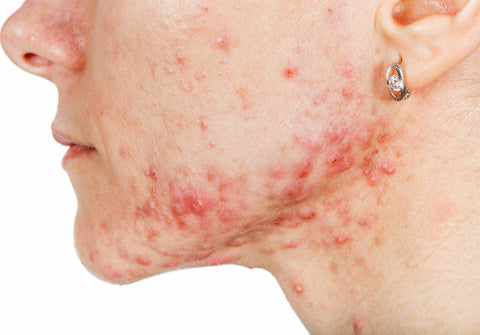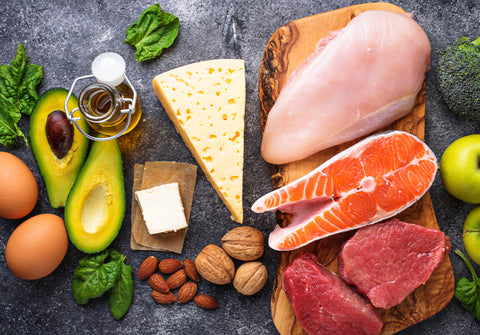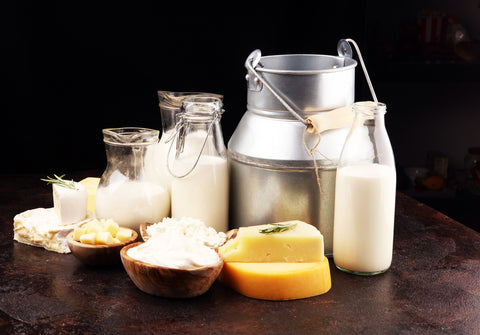
Does Diet Affect Acne and Spots?
Being a spot-prone hooman is not easy at the best of times. It can mean a lot of anxious mirror-watching, and in teenage years in particular, it can mean having a shelf full of quick-fix acne products which can be just as likely to sting the bejesus out of your skin as make any sort of impact (none in particular… Cl**n & Cl**r).
Having acne is more than a mere annoyance, however - there are very real links between acne and diminished mental health, particularly in women. Acne can commonly affect your self-image, self-esteem, confidence and can impact your lifestyle in a wide range of seemingly disconnected ways - maybe it has meant that you don't like to look at yourself makeup free, or maybe you have to work up to going to the gym not in advance of the exercise, but because it’ll mean going bare-faced.
There’s a myriad of ways that acne can affect you. Even when you’re through the worst of a breakout, you might end up needing to treat post inflammatory hyper-pigmentation (red, residual marking), as a result of acne.
And with that in mind, if you’re a spot-prone hooman, you might be able to relate to being at the receiving end of food-shaming if you appear to eat any foods which don’t align perfectly with public perception of what a hooman with acne should be eating - but is this anxiety around diet justified when it comes to acne?
We’ve been chatting to Orla Walsh, Registered Dietitian of Dublin Nutrition Centre about all things acne and diet, and we will be sharing her pearls of wisdom.
First of all, let’s talk shop.
What Is Acne?

Glad you asked. Acne is a medical skin condition, and much as you might not like to hear it - acne covers a lot of bases.
Acne means all forms of breakout - from minor forms like blackheads all the way to the real humdingers of what we would call cystic acne.
Acne is most commonly associated with teenagers, but as I can tell you myself, it does not have an age limit.
There is little definable difference between having acne and being prone to a breakout now and again, although acne is usually differentiated by the spots being infected.
Acne is known to be caused by several factors.
-
Hormones: when hormone levels fluctuate, androgens (male hormones, present in women too) might prompt our sebaceous gland to overproduce sebum, clogging pores.
-
Hyperkeratinisation: the skin’s inability to self-exfoliate.
-
Overproduction of sebum: if we over-exfoliate and the skin compensates by producing an excessive amount of oils.
- Bacteria: p.acnes (propionibacterium acnes) is the bacteria which causes more severe forms of acne by getting into the pore and causing cellular damage.
It’s worth noting that this bacteria hasn’t got a lot to do with hygiene, and washing your face won’t get rid of it.
Acne can be cured, although it’s something that many people will have to manage throughout their lives. Using the correct products alongside a robust skincare routine can help, as can ditching bad skincare habits, but sometimes medical intervention might be necessary.
Acne affects a broad spectrum of hoomans, and can be hugely and wrongly stigmatised.
Does Diet Affect Acne And Spots?

If you were a spot-prone teenager, you may remember the shame of tucking into some sort of tasty treat, be it a chocolate bar, a pizza, birthday cake or anything remotely similar, only to have the evil eye cast upon you by someone who thought it wise enough to wonder aloud if your particular choice of treat was the reason for your current breakout situation. It might still happen to you now!
These comments were rarely useful, always hurtful and now as we think about it, without any solid foundation! We highly doubt any of those sometimes well-meaning, always judgy hoomans were dermatological scientists, although they definitely knew how to get under our skin.
There are heaps of studies examining the possibilities of links between diet and acne, but as we will discover, these are often inconclusive, or at the very least require further study.
So, really - does diet affect acne and spots?
Does Sugar Affect Spots and Acne?
When it comes to talking about sugar, this might be something which you’ve seen have an effect on your own skin, or something which rings true for you, but what effect does it have at large on acne and spots?

Sugar is always something which we know we should consume only in moderation, but issues occur when it comes to the glycaemic index (GI). This is something you might have heard of before.
This is a way of classifying foods with regard to how fast they raise the glucose level of the blood. Sugary foods like sweets and chocolate raise the glucose levels of your blood more quickly than other foods, and this can cause your insulin levels to spike. This can result in inflammation, which in turn can lead to breakouts and can negatively impact your acne.
There have been studies which have linked a diet rich in carbohydrates which ranked high on the GI scale and adults presenting with acne, although further research is suggested to be required. Another study concluded that “a high-glycemic-index/-load diet was positively associated with acne vulgaris”.
According to dietician Orla Walsh, “Although we can apply nutrients to our skin, it’s also important to eat them orally. Certain antioxidant vitamins are really important for the skin, including vitamin C and vitamin E. One method of trying to control acne with diet is to use dietary interventions, which decrease or control insulin levels, so for that reason, often people are encouraged to reduce their sugar intake and also follow a low glycemic load diet. A low glycemic load diet focuses on low GI carbohydrates and makes sure that each meal is balanced so every time you have these low GI carbohydrates, you also couple them with fruit and veg for more fibre, a protein source as well as a healthy fat source.
By balancing each of your meals, so by having the low GI carb with the protein, the fat and fruit and veg, by balancing each of your meals you’re slowing down the release of the carbohydrate from the food into your bloodstream, and when that happens, your blood sugar levels and therefore your insulin levels are much more controlled.
In terms of a time frame, one of the studies showed that by following this low glycemic load diet, after twelve weeks, the total number of acne lesions had significantly decreased, so that gives people an idea of how long they might have to wait before they see the benefits.”
This isn’t to say that sugar, carbohydrates or anything of the kind is the reason that you have acne. The reasons for acne are many and various, as we have said below, but in these tests, scientists have been able to draw some conclusions, although all studies end with the warning that further research and sample sizes are required.
Does Dairy Affect Spots and Acne?
Dairy is another factor which people can often associate with increased risk of acne, or worse breakouts.

There are plenty of bloggers or influencers who advocate giving up dairy as a miracle cure for acne. Although one study notes that “there has been a remarkable paucity of evidence for an association between diet and acne”, it still concludes that there is some sort of connection between the intake of dairy in teenage girls and their propensity to suffer from acne. However, many studies rely on self-assessment from hoomans suffering from acne, and so do not provide the most reliable information.
Studies disagree on this point. I am not a dietitian or nutritional therapist, but at The Skin Nerd, we have seen a difference in clients who have eliminated or reduced their dairy intake, particularly if they have found that traditional methods to improve their acne have failed. It doesn’t work for everyone, but it could be something to consider if you’re truly at your wit’s end - just be sure to get all of the nutrients that you require from different sources if you try this, and be sure to check in with your GP.
Chocolate and Spots
Orla Walsh is well aware of how chocolate can be regularly blamed for causing acne.

“Often chocolate is linked to acne and there’s only a few studies that have examined this. The most thorough study on this topic to date was one where they got participants to eat a whopping 1,200 calories worth of chocolate every day, and interestingly enough it was found that there was no significant increase in the oil production in the skin despite having this enormous amount of chocolate!”
We’re not saying that this is now a free pass to go in on early Easter eggs (too soon?) but it’s an interesting result, and one you can happily parrot back if anyone is getting a bit too superior about whether or not you should be eating that chocolate biscuit.
Does Greasy Food Affect Spots and Acne?
Many think that if you eat oily food, you’ll get oily skin, and oily skin means acne - right? Not quite.
The oil which we consume and the oil which is excreted by your pores are very different, and they do not interact.
Greasy food or junk food may convert faster to glucose in your blood, which may affect your acne, but greasy food does not directly link with acne - although we don’t advocate it at all. It’s still not good for you, and overindulging does not help you to feed your skin from the inside out.
However, if you’re a messy eater and slather burgers on your face while you eat them - then that oil might block your pores and worsen your congestion, but honestly if those are your table manners, then I think you might have bigger problems.

What Food Is Good For Acne?
There is plenty of food which you can eat in order to feed your skin as it deserves, and plenty which is useful when it comes to protecting acne-prone skin.
Increasing your intake of vitamin A in your diet would be a great place to start. Vitamin A helps to improve skin proliferation, meaning it encourages your skin to slough off dead skin cells rather than allowing them to remain in the pore and block them. Liver is a great source of vitamin A, as well as sweet potato, carrots, dark leafy greens, pumpkin, kale, goat’s cheese - the list goes on.
Orla Walsh suggests adding anti-inflammatory ingredients to your regular cooking. “Another thing that people might want to try adding a little bit more to their meals in to see if it makes a difference in terms of its antibacterial and anti-inflammatory properties is tumeric.”
Tumeric is particularly delicious when added to scrambled eggs, rice or even smoothies!
Upping your omega intake is also good news if you suffer from acne - omegas are a form of essential fatty acid, and as such are very helpful if you have congestion or acne-prone skin, as it is also super helpful in improving the skin’s rates of proliferation. Omega supplements like Solgar Omega 3 Triple Strength Supplement would be a good option. Omega rich foods include oily fish, salmon, mackerel and herring, as well as nuts like pistachios, walnuts, and chia seeds too.

A Final Word On Acne
We can enjoy a diet which is good for us and helps us to feed our skin from the inside out, and plenty of the stuff which we enjoy can help to improve the appearance or symptoms of acne. When it comes down to it, though, we can’t be completely definite when linking certain foods with acne flare-ups. There simply haven’t been enough studies.
When you’re going through an acne flare-up, it can sometimes feel like the eyes of the world are on you, and judging you for what you are or aren’t eating, but I would advocate for keeping to a balanced diet full of vitamin-rich foods, and checking in with your doctor or dietitian if you are concerned that it’s your diet which might be feeding your breakouts.
Your skin is an organ, and acne is a medical condition, so blaming yourself and getting frustrated with your skin will not help matters. It’s like blaming your ears for an ear-infection, or your wrist for spraining itself. Instead of blame and frustration, we should turn our focus towards treatment, and even medication if necessary.
We have been in conversation with Orla Walsh, RD. Orla is a qualified Dietitian and member of the Irish Nutrition and Dietetic Institute (M.I.N.D.I.) and Self Employed Dietitians of Ireland (S.E.D.I.). She is also registered with CORU and is on the Panel for the Provision of High Performance Sport Services in Ireland.
